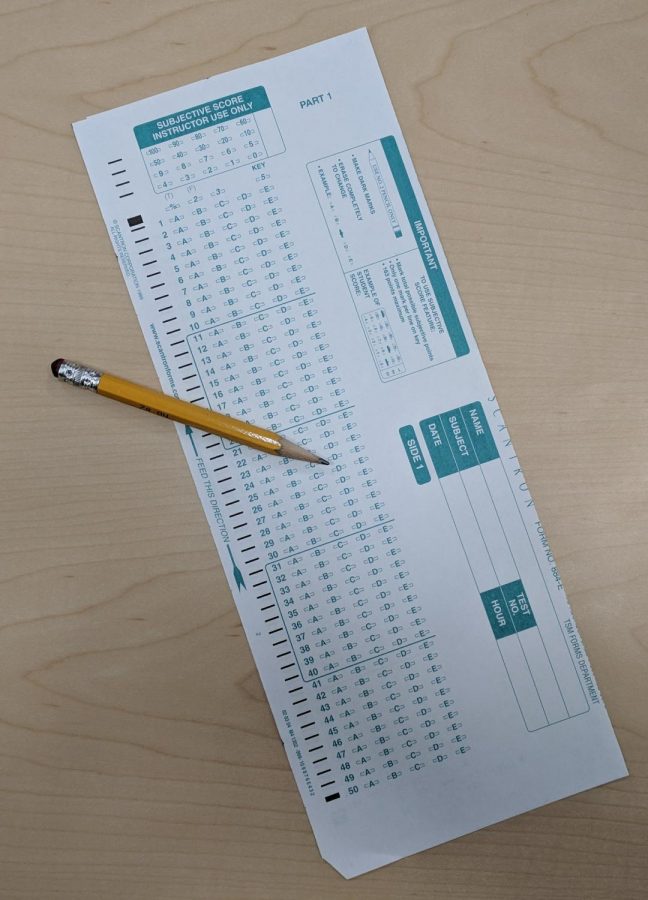The Notorious Mid-Term Exams
The infamous Scantron form is an all too familiar sight when taking mid-term exams. Scantron forms contribute to the convenience of midterms because each student’s exam is graded by simply scanning the form on a machine. This expedites the grading process.
February 9, 2018
You have 90 minutes to keep your grade afloat — Ready, set, go! Typically accounting for 5% of the overall course grade, mid-term exams hold significant implications and offer students a taste of final exams five months before the end of the year. Because of these reasons, students often dread these exams. While midterms commonly represent significant sources of stress amongst the student body, some students actually prefer taking them. For instance, State High junior Woojin Lee favors midterms because they decrease the amount of content included on the final exam. “I think mid-terms are nice because in most classes finals are on materials covered after the midterm, and not the entire year,” expressed Lee. Other students’ midterm preferences depend on the specific class and the structure of the material covered in the class. “I do not like midterms, except for in math class. In math I prefer to have them because it is hard to remember everything throughout the whole year, but in general, I think midterms are stressful and I don’t like them,” remarked Emily Irvin, a senior. Senior Shreyas Sundar also has a varying opinion on midterms, depending on the subject. “[A]s holistic assessments tend to be a necessity for education, I prefer mid-term exams in subjects such as math or history. That being said, a lot of other social studies classes seem to warrant having a final without a mid-term as the material seems to be far more interconnected, analytical rather than informational and condensed,” explained Sundar.
Midterms usually have a multiple choice format, but some of them may be structured differently depending on the type of course. Although the multiple choice format may be necessary to pragmatically determine students’ mastery of the course content (it is the simplest, most efficient method), it is debatable whether or not it represents a robust tool for assessment. Having a multiple choice exam opens up the possibility of students getting correct answers by guessing, which may not be a true indicator of their proficiency. Additionally, the multiple choice format may restrict the amount of material a teacher can include on the exam. However, in spite of these issues, multiple-choice midterm exams may represent the best overall format, in part due to the stress that they can alleviate. “I prefer multiple-choice exams. They are less stressful, and even if you forget something you generally have a 1/4 chance of getting it right. Open ended exams are much more stressful,” commented Irvin, when discussing her preferred midterm format.
At first glance, midterms and final exams may seem like remarkably similar exams — both are usually comprehensive, rigorous exams that feature extensive amounts of material. However, there exist several factors, including stress levels, the timing of each test, and grades, that differentiate between the two exams. “As I tend to cut it close with my grades, finals tend to stress me out more,” Sundar expressed. Agreeing with Sundar, Lee added that he perceives finals as being more stressful “because you know that there is no way to make it up if you screw up.” On the other hand, Irvin remarked that midterms are more stressful because “there are more unknown variables.” With all this being said, the difference in stress between midterms and finals varies according to the situation and is specific to the individual. While students must deal with a greater degree of uncertainty with respect to grades when taking mid-term exams, final exams can be equally, if not more stressful, because they hold the final influence on the course grade.
With as much influence as they have on students’ academic lives, mid-term exams can dictate how students feel and behave. In the aftermath of the test, a student may become ecstatic after learning of his/her high score. The exact opposite may occur, though, with the student feeling ashamed and furious after receiving a low score. “Because of the competitiveness of our education system, people allow their perception of their self-worth to vary based on simple things such as one test. That’s why it’s important to teach the idea that one assessment does not necessarily demonstrate one’s abilities and certainly does not demonstrate one’s self-worth,” Sundar explained. This point remains ever crucial to keep in mind — midterms may be intimidating, inducing an inordinate amount of stress, but they do not define you as a person.












